|
|
|
Sort Order |
|
|
|
Items / Page
|
|
|
|
|
|
|
| Srl | Item |
| 1 |
ID:
124336
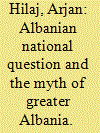

|
|
|
|
|
| Publication |
2013.
|
| Summary/Abstract |
To know what the Albanian National Question (ANQ) is, one should learn it not from what its neighbors, namely Serbia and Greece, have to say, but from a more direct and reliable source, the voice of the Albanians themselves. No nation is in a position in which it can express in a realistic way the needs, rights and aspirations of a different nation in the same way as an individual cannot be an exact representative for anyone but himself. For many years the Western countries used to rely on either Serbian or Greek lenses for the ANQ. In the late 1990s the U.S.-led intervention against Serbia over Kosovo on humanitarian grounds and the Albanian insurgency in Macedonia has contributed to an altered power balance in the region. The neighbors frightened by the power shift in the Southern Balkans use their propaganda machinery to express the danger posed by the alleged Greater Albania scheme in order to demonize and morally downgrade the ANQ. However, one can easily see that Albanians since the creation of their state have not, are not, and will not pursue an irredentist agenda toward their neighbors.
|
|
|
|
|
|
|
|
|
|
|
|
|
|
|
|
| 2 |
ID:
124337
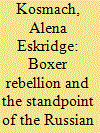

|
|
|
|
|
| Publication |
2013.
|
| Summary/Abstract |
The article is devoted to the examination of the reaction of the Russian press towards the Boxer Rebellion in China. The events connected with the Boxer Rebellion in China had a very strong influence on Russian society and its press. The development of Boxer Rebellion and the suppression of it made Russia define its position on the question of China and at the same time became one of the most important topics for the Russian press in 1900. The discussion of the problem revealed the different points of view and the different approaches towards the solution of this problem in Russian Far Eastern policy.
|
|
|
|
|
|
|
|
|
|
|
|
|
|
|
|
| 3 |
ID:
124341


|
|
|
|
|
| Publication |
2013.
|
| Summary/Abstract |
At the beginning of the Soviet-German war in June 1941 most Anglo-American Government officials believed in a swift collapse of Soviet resistance. When the collapse did not materialize assessments gradually changed and a more realistic outlook on Soviet war potential was eventually produced. But it was not until the late summer of 1943 that the Anglo-Americans finally believed in a more sustained Red Army offensive effort against the Germans, and even then US observers still underestimated Soviet strength. During the whole period 1941-1943 British observers generally had a relatively more realistic apprehension of Soviet capabilities. The Anglo-American perceptions and the change in perceptions, considering the whole context of World War II, had implications for the Western Allied war effort.
|
|
|
|
|
|
|
|
|
|
|
|
|
|
|
|
| 4 |
ID:
124342
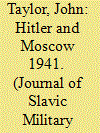

|
|
|
|
|
| Publication |
2013.
|
| Summary/Abstract |
The fate of Moscow is considered to be one of the major factors determining the outcome of Operation Barbarossa in 1941. Historians have, for a long time, tended to focus on the battles, which took place for the city during this period. The role of the Soviet capital in terms of its importance to Hitler's overall strategy is, however, less well known. The article explores this aspect of the Soviet-German war, which has been largely neglected in postwar literature. It demonstrates that Hitler never regarded Moscow as a priority, nor did he intend to occupy the city.
|
|
|
|
|
|
|
|
|
|
|
|
|
|
|
|
| 5 |
ID:
124338


|
|
|
|
|
| Publication |
2013.
|
| Summary/Abstract |
G V Burman - Major General
Major -General - GV Burman
World War-I
Russia
Russian Air Defence Systems -RIDS
Military Development - Russia
Tsarist Officers
Long Forgotten Heroes - Russian Army
Soviet Empire
Heroic Dead
|
|
|
|
|
|
|
|
|
|
|
|
|
|
|
|
| 6 |
ID:
124329
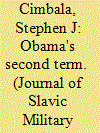

|
|
|
|
|
| Publication |
2013.
|
| Summary/Abstract |
The second term of the Obama administration will doubtless see efforts by the United States to move forward its nuclear arms control and disarmament agenda, especially with Russia. However, there is no certainty of accomplishment in this regard, and much depends upon the political chemistry between a reelected U.S. President Barack Obama and a re-reelected Russian President Vladimir Putin after 2012.1 This discussion considers the political setting and military options for post-New START strategic nuclear arms reductions, as well as other military-strategic and political issues within which U.S., Russian, and NATO nuclear arms control options are embedded.
|
|
|
|
|
|
|
|
|
|
|
|
|
|
|
|
| 7 |
ID:
124343
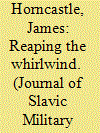

|
|
|
|
|
| Publication |
2013.
|
| Summary/Abstract |
On 25 June 1991 Slovenia declared independence from Yugoslavia. Most outside observers assumed that the federal army, the Yugoslav People's Army (YPA), would quickly reassert federal authority over Slovenia. Instead, Slovenia not only defeated the YPA, but would gain the initiative against the mechanically superior force. This article will argue that one of the principle reasons for Slovenia obtaining independence was that it benefited from the military heritage of the Yugoslav defense policy of Total National Defense (TND), whereas the YPA was largely inhibited by its legacies.
|
|
|
|
|
|
|
|
|
|
|
|
|
|
|
|
| 8 |
ID:
124344


|
|
|
|
|
| Publication |
2013.
|
| Summary/Abstract |
One of the most sordid and obscure aspects of the Soviet-German War, 1941-1945, involved the repression of Red Army senior officers, who, in Stalin's eyes, failed to fulfill their duties to the Motherland. This article, the second part in a multi-part series, exploits hitherto secret archival documents to 'raise the veil of secrecy' from this tragic aspect of the war, which took its greatest toll of senior Red Army military leaders during the disastrous Barbarossa campaign in the summer and fall of 1941.
|
|
|
|
|
|
|
|
|
|
|
|
|
|
|
|
| 9 |
ID:
124334


|
|
|
|
|
| Publication |
2013.
|
| Summary/Abstract |
This article analyses the motivation of Slovakia to conduct UN peacekeeping operations. This means whether Slovakia participates in these operations on the basis of the logic of consequences or the logic of appropriateness. The official rhetoric has operated with the logic of consequences (instrumental approach), which is used to justify the very broad participation of Slovakia in peacekeeping. However, the relatively non-selective territorial participation in peacekeeping operations would give evidence to actions led by the logic of appropriateness. Nevertheless, the analysis of the individual aspects of Slovak participation has shown relatively convincingly that in the actions of Slovakia in this field-after a short initial phase indicating more likely the logic of appropriateness-an instrumental approach prevailed.
|
|
|
|
|
|
|
|
|
|
|
|
|
|
|
|
|
|
|
|
|